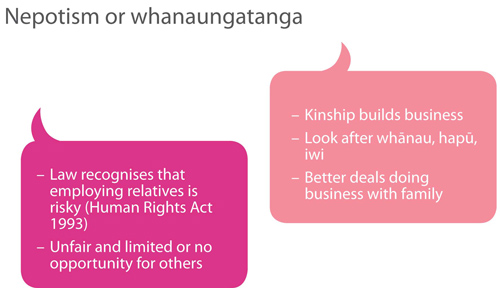TWOA's response
TWOA and its supporters felt that the OAG's investigation focused too much on negatives. They said it ignored the wānanga's success in furthering the education of people that the mainstream system had failed. Many TWOA employees said that the Tumuaki was a visionary leader and was largely responsible for the wānanga's success.
Spending of public money
TWOA said that, because it had grown rapidly as an organisation, some spending decisions simply had to be made quickly. Organising quotes and tenders was not always possible.
TWOA also said that spending was always planned and assessed, but usually orally. (In Māori culture, knowledge and ideas have customarily been relayed in oral ways.) It also said that it had been improving its written records and introducing policies to meet government guidelines, but this was a gradual process.
Conflicts of interest
Personal relationships
TWOA saw the close ties among its employees and contractors as positive. Employees had a strong commitment to TWOA's goals, and quality was never an issue. Also, in the wānanga's difficult early days, many employees had worked long hours for little or no pay.
The wānanga's supporters, including Tariana Turia, co-leader of the Māori Party, pointed to a clash of cultural values. They said that what Pākehā condemned as 'nepotism', Māori respected as 'whanaungatanga' (kinship). Turia said that Māori had wider relationships than non-Māori and that looking after whānau, hapū and iwi was key. Because Māori organisations tended to come under public scrutiny, they were even more likely to employ relatives and others they trusted.
TWOA said that it got better deals on goods and services from family and other known people. The Tumuaki said that a competitive approach to recruitment did not always bring the best results and was not always the best use of time and money, and he said that, in business matters, he was harder on family members than on others.

Relationship with AI Trust
The feeling at TWOA was that the relationship with AI Trust was positive and natural, even though one organisation was public and the other private. The organisations shared a kaupapa (philosophy) and a vision of furthering Māori. People described AI Trust as TWOA's 'parent'. Without its support, TWOA wouldn't have survived its early days, when it had little government support.
International travel
TWOA said that its international travel had been approved, but approval was oral.
It said that one non-business trip was a bonus for high performance. The other was for the death of a relative of the Tumuaki's fiancée and also involved business. His fiancée generally travelled with him not in a personal role but as a contractor to TWOA. First-class travel was sometimes chosen because of the Tumuaki's health.
Though the Tumuaki paid for some personal expenses on the business credit card, he also paid for business expenses with his own money and didn't usually ask for repayment.
The Tumuaki said that bank restrictions in Cuba had forced him to withdraw cash from the business credit card there. Also, in some cases, he wasn't able to get receipts from Cuban companies.
The two cash donations were gestures of goodwill and were mostly his own money, not public money. (The giving of koha, or goodwill gifts, is a valued customary practice among Māori.)
